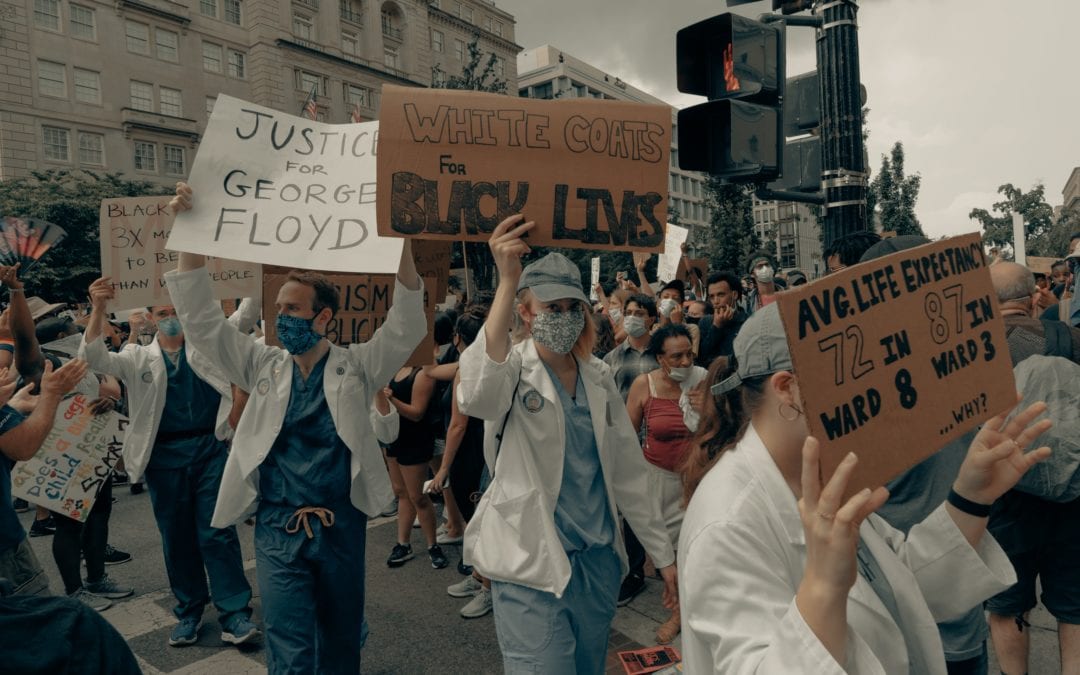I finally mustered the courage, took a deep breath, grabbed my bags, and walked into the hospital. I arrived 20 minutes early for my overnight shift, and sat in my car, in silence, hesitant to leave the garage. I was dreading the walk from the employee garage to the Emergency room where I worked. It wasn’t a long walk but the front lawn which I always adored as it shone beautifully with lights, had now become a reminder of a short-lived but traumatizing event.
A day earlier, on June 5th, most hospitals across the country observed a moment of silence for 8 minutes 46 seconds in solidarity for the murder of George Floyd, the black man killed in Minneapolis as a result of Police brutality. This symbolic gesture was adopted by most protesters across the United States and on this day, health professionals under #whitecoatforblacklivesmatter chose to join in solidarity. For most people, it was a moment to reflect on his death. For me, it was the most grisly experience I have had since June 2014, when I migrated to the United States.
I was hesitant to attend this solidarity event for many reasons. I never watched the full video of his murder but the snippets. I boiled with emotions; anger, outrage, indignation, and disgust. I was uncertain how I would respond to this event. It was my day off work; nonetheless, I hurriedly rushed into the hospital and made it to the location of the gathering, just in the nick of time. It was the beginning of a gruesome period.
Within a minute of kneeling on the front lawn, I became very uneasy, sweaty, and upset. It was sunny but that wasn’t the worst weather I had experienced. I knew that was not the cause of my discomfort. We were kneeling on soft grass so my uneasiness was not due to an aching knee. It was uncontrollable emotions of anger, hurt, anguish, and fear. As time progressed, I was engulfed by a feeling of betrayal, that I was kneeling on George Floyd and killing him once again.
I struggled in between sobs to breathe under the mask that I wore as I recalled the words he repeated severally while he slowly died, “I can’t breathe”. All participants at the solidarity event wore masks to protect ourselves from the already ravaging pandemic of COVID-19 and we were kneeling in the union for a movement aimed to end another pandemic that has killed black people for years, Racism. I knelt on and wept under a mask that hid my face and emotions from the world but suffocated me like I was in a chokehold.
My wristwatch didn’t have a minute hand so I could not estimate how much longer we had to observe this time but it felt endless; similar to the description most parents gave me in the emergency room when I asked how long their child’s seizure lasted.
Halfway through, I was plagued with the urge to get up and walk out; out of the death scene I was replaying again, the killing of an innocent man. Immediately, I imagined how disappointed he and every other black person would be if I did. Surrounded by my mostly white counterparts, I was supposed to be the one who knelt for the whole duration. I knew that by walking out, I would be judged as the one who disrespected the movement, the moment, and the black man.

I knelt on with the traumatic vision of me kneeling deep on George Floyd and my black son’s neck. I grasped the soft grass as I knelt, pulling out some straws as a way of transferring my aggression. It seemed to be the only way to ease my plight at the time. I knelt only to be traumatized, with flashbacks till now.
Eight minutes and 46 seconds is extremely short for a kid who wants to savor all the fun. But to me, it aroused negative feelings of a lifetime as an immigrant black mother. It evoked feelings of fear and agony that even though my first son is excited to be a teenager in 2 months, he is crossing the line from being perceived as a cute black boy to a potential threat; feelings that though I lived a racist-free life growing up in Nigeria, my kids may never play as freely as they wanted. They may never run around my backyard with a toy water gun lest someone may misunderstand it for a real gun, call the cops who could have them shot as Tamir Rice. They may never be given an opportunity to prove they are innocent before being arrested or killed just because they are black.
At the end of our kneeling moment, while my colleagues stood, reflecting on the sad moment, I was shivering, fidgety, and confused. As a Pediatrician in an emergency department, who has learned how to stay calm over time, I was consumed and overwhelmed, finding it hard to compose myself. I have never lost a parent or a child and didn’t know if this was a glimpse of what it would feel like but would rather not re-live this experience.
I knelt in solidarity for the murder of George Floyd, an innocent black man who we all hope his death may change the world as it unifies us together to fight racism. It was the right thing to do. However if this revolution doesn’t lead to positive changes for black lives, I may have to live with lifetime blame that I moved from a country where my sons would have blended in as black kids to one they are seen as different and a potential threat.
Dr Nkeiruka Orajiaka is a board certified Pediatrician with a Masters in Public Health from Columbia University, New York. She currently practices as a Emergency Room Pediatrician in a busy ER in Columbus Ohio. She is a passionate health educator and a strong advocate for children’s health and wellbeing. She shares her passion for medicine, motherhood and motivation on her blog – drnkeiru.com Her Instagram handle is @dr_norajiaka




